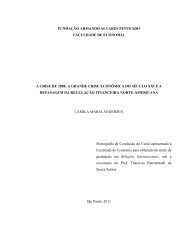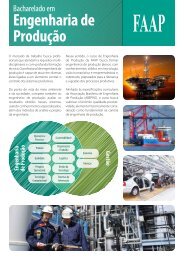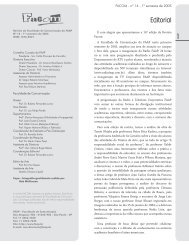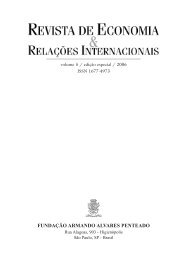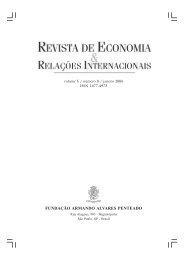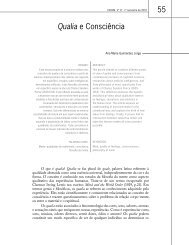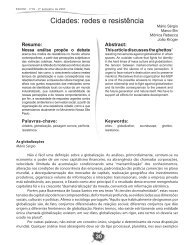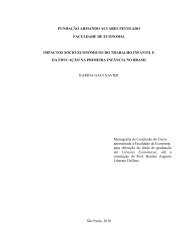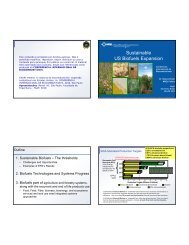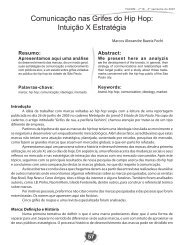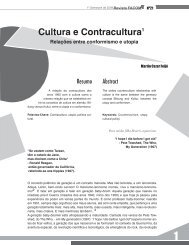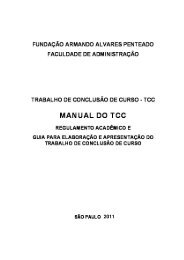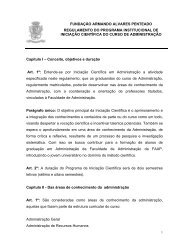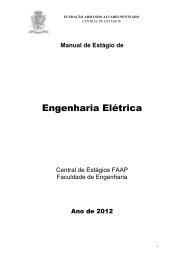Guia de Estudos - Faap
Guia de Estudos - Faap
Guia de Estudos - Faap
Create successful ePaper yourself
Turn your PDF publications into a flip-book with our unique Google optimized e-Paper software.
<strong>Guia</strong> <strong>de</strong> <strong>Estudos</strong> / Study Gui<strong>de</strong> / <strong>Guia</strong> <strong>de</strong> Estudios<br />
nomic integration which was done through the use of<br />
macroeconomics politics, and also gui<strong>de</strong>d them to improve<br />
the reciprocal relations among States through<br />
unilateral concessions, in other words, it means that <strong>de</strong>veloped<br />
countries should make more openings, commercial<br />
concessions, to the least <strong>de</strong>veloped countries.<br />
One of the results of this was the action of settling a<br />
minimum price for commodities which was a strategy<br />
to reach international stability when competing and in<br />
comparison with the price of industrialized goods. An<br />
easier access to more active markets was got trough the<br />
extinction of protectionists policies once practiced by<br />
the <strong>de</strong>veloped countries, besi<strong>de</strong>s the preferential tariff<br />
concessions for importing manufactured goods and the<br />
exportations of the least <strong>de</strong>veloped countries, technical<br />
assistance to the countries that nee<strong>de</strong>d was provi<strong>de</strong>d.<br />
This last one became a key to open a <strong>de</strong>bate over financial<br />
subjects, a weaker field which gained importance<br />
on these <strong>de</strong>bates and so, giving importance to the invisible<br />
products as well.<br />
The highest point of concern of Prebisch and the<br />
other intellectuals was how to <strong>de</strong>velop the least <strong>de</strong>veloped<br />
countries through a strategy that used mechanisms<br />
which would not create <strong>de</strong>pen<strong>de</strong>nce with the<br />
<strong>de</strong>veloped countries. Having this as an important issue,<br />
the organism brought up a new discussion to the international<br />
society. The North-South <strong>de</strong>bate carried on the<br />
discussion about the more <strong>de</strong>veloped countries, North<br />
hemisphere, helping the countries located in the south,<br />
the less <strong>de</strong>veloped. In conclusion, it is assumed that<br />
North-south cooperation, takes financial, commercial<br />
and economic help to the southern countries, which<br />
got benefits from this special treatment.<br />
This treatment was reflected in other organizations<br />
as the International Monetary Fund (IMF), Inter Américan<br />
Development Bank (IADB), the World Tra<strong>de</strong> Organization<br />
(WTO) and in the organisms which belong to<br />
the World Bank Group. The strongest influence over IMF<br />
was the raise of compensatory financial facilities as a<br />
consequence from the reduction of the commodities<br />
exportations, which occurred due the fact that policies<br />
over the stability of commodities prices were <strong>de</strong>bated<br />
together with the industrialized goods prices. Other evi<strong>de</strong>nce<br />
that impact was suffered by IMF was the raise of<br />
<strong>de</strong>veloping and financing programs being <strong>de</strong>veloped,<br />
and most focused on the low income countries.<br />
In comparison, The Pearson Commission (1969),<br />
while reviewing World Bank assistance since World<br />
War II, found that “technical assistance often <strong>de</strong>velops<br />
a life of its own, little related in either donor or recipient<br />
countries, to national or global <strong>de</strong>velopment objectives”.<br />
Later evaluations have not found solid evi<strong>de</strong>nce<br />
of the broa<strong>de</strong>r effect of technical assistance on sustainable<br />
capacity <strong>de</strong>velopment. The main contribution<br />
of the report “ (…) is undoubtedly the comprehensive<br />
view it takes of <strong>de</strong>velopment as a complex of domestic<br />
and external factors (tra<strong>de</strong>, aid, private investment), as<br />
well as the reasons it adduces in favor of enlarging present<br />
aid programs.” This shows the importance and efficiency<br />
from allying with international organizations in<br />
a country’s domestic framework towards <strong>de</strong>velopment.<br />
The WTO is responsible for the regulamentation of<br />
world tra<strong>de</strong>; it created mechanisms to protect the countries<br />
that were damaged by having no benefits and for<br />
being low-income countries. Based on this, negotiation<br />
rounds began to happen, for example the Uruguay<br />
Round and the Doha Round, where countries could seek<br />
to regulate the minimums and maximums of tariffs in<br />
products of certain sectors. Textile, service, and agricultural<br />
sectors were the ones that most suffered changes.<br />
In the other hand, the World Bank has many “branches”<br />
and each one of its branches is specialized in financing<br />
certain types of projects. This expansion shows the<br />
high <strong>de</strong>mand for financing which comes from the lowincome<br />
as much as from the <strong>de</strong>veloping and the <strong>de</strong>veloped<br />
countries.<br />
The 1960´s can be seen as an important moment<br />
for <strong>de</strong>velopment, once by this time <strong>de</strong>veloping countries<br />
were well succee<strong>de</strong>d achieving benefits, and also<br />
by the beginning of the North-South <strong>de</strong>bate. In 1970´s,<br />
the new international or<strong>de</strong>r was discussed and also having<br />
in its course the North-South negotiation, its system<br />
structure and the <strong>de</strong>mand of common interests among<br />
the countries. The North- South cooperation was settled<br />
with the principle of assisting, in other words, with the<br />
principle that more <strong>de</strong>veloped countries should aid less<br />
<strong>de</strong>veloped ones.<br />
In this environment, in 1974 was created the Charter<br />
of Economic Rights and Duties of States , which established<br />
the right of nationalizing sources, the submission<br />
of multinationals companies to the country’s laws, the<br />
control over capital flux, the right of <strong>de</strong>velopment and<br />
117




